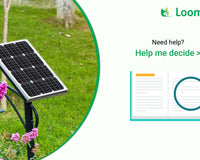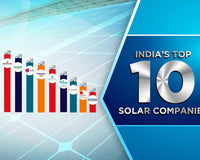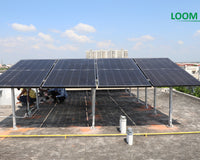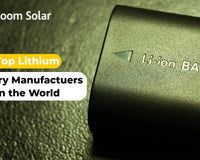In modern times there are multiple ways to generate electricity to fulfill your energy need and don’t need to wait on government for electricity. Solar is one of the low cost, green energy and sustainable product that can be owned by each one of us.
How it works?
It is important to learn that how it is made, it is made of silicon as a material, which is commonly found on our earth, as we know that making silicon cells of desired quality is difficult and expensive process.
However, home solar system are being built with similar material but at very low cost like copper, indium, gallium, and selenide (CIGS), It is not as efficient as high quality silicon cells but still it provides adequate amount of power at very low price so it is affordable for most residential.

When it is manufactured small amounts of other element are added to alter the electrical charges of the silicon atoms. This results in strips of negative (n-type) silicon, which has an extra electron; and positive (p-type) silicon, which is missing one electron. Though when it is sandwiched together these two types of silicon form a photovoltaic cell and when multiple photovoltaic cells are placed under glass simultaneously, they provide us panels we see atop building today.
Inside each solar panels, there is a conductive metal plate connected to wires that lead to a fused array combiner. A device is used to collect energy through an inverter, where the energy’s natural direct electric current is changed to the alternating electrical current required to power human made appliances.
How solar power turn into electricity
Sunlight is a form of energy consisting of invisible photons that have energy, but zero rest mass. When photons come in contact with other photons, energy expands in several ways depending upon the kinds of atoms they touch. Mostly heat is generated when it happens.
On the other side, electricity is produced when electrons circle atoms, the reasoning behind why photovoltaic cells contain materials with different electrical charges. See, when the sun hits a silicon crystal, the electrons inside of it begin to jump up and down. And eventually, some of them become so charged up, the break free and move more freely. The n-type silicon electrons seek out the ones in p-type silicon to replace the missing electrons within their atoms producing an electrical current from the motion of these electrons.
The amazing semiconductor qualities of silicon (similar material) make it possible to sustain constant electron imbalances. Meaning a steady supply of solar electricity is going to be at hand every time the photons hit the solar panels. A current collected by wires and carried throughout the system.
Key challenges in electricity generation using solar panels?
Now you got awareness about electricity generation using solar panels but there are few points that must you keep in mind during designing and installation of solar system at home.
- Shade: If you know about solar then you must be knowing about shade, if solar panels are installed under shade it won’t provide full efficient electricity compare to direct sunlight.
- Seasonality: Due to change in weather, energy efficiency of solar change day by day or month by month. A cloudy day won’t produce much electricity as summer day.
- Tilt: Solar panels are more effective if its mounted in correct direction facing direct sunlight, In real scenario, solar panel should be at the same angle as latitude where they have mounted. Usually it should be between 30-45 degree in most scenario.
- Azimuth: It is compass direction where sunlight is coming. During noon sunlight comes from south side, A wrong angle also will reduce efficiency of solar panels.














3 comments
Angel Castor
I’m Angel Castor from the US. White Caucasian Female. I’m 43 years old and I got married at the age of 25, I have only two children and I am living happily.
After five years of marriage my husband’s behavior became so strange that I didn’t really understand what was going on. He packed out of the house to another woman’s house and I love him so much that I
never dream of losing him, I tried my best to make sure that my husband got back to me but all to no avail, I cried and cried seeking help. I discussed it with my best friend Alison and she told me she can help me. She told me of a man called Dr. Odunga, she told me he is a very great man and a real man that can be trusted and there is nothing concerning love and Pregnancy issues he cannot solve and she told me how he has helped her and countless number of people in
restoring their relationship. I quickly contacted his email address at odungaspelltemple@gmail.com I explained all my problems to him, he told me that I should not worry that all my problems will be fine. Presently, I am very happy I got my husband back to me with the help of Dr. Odunga and we are living happily with so much love for each other. What-app message/call him at +2348167159012 to help you
Manuel Franco
I just want to say Thank You to everyone who supported me through the years. My name is Manuel Franco, New Berlin, Wisconsin. My story of how I won the Powerball lottery of $768.4M is a bit of a tale. I have been playing Powerball tickets for 6 years now since I turned 18. I bought my first ticket on my 18 birthday. I was feeling very lucky that day because I had contacted Dr. Odunga Michael to help me with the winning Powerball numbers. I really had that great great feeling that I looked at the camera wanting to wink at it. I only did a tiny part of it and trusted him. He gave me the numbers after I played a couple other tickets along with it for $10. I checked my ticket after the winnings came online and saw the numbers were correct including the Power play. I screamed for about 10 minutes because it felt like a dream. I had won $768.4M. You can check my winning testimony with the lottery officials just with my name search. Thank you Dr Odunga. Well, his email is odungaspelltemple@gmail.com and you can also call or Whats-app him at +2348167159012 so you guys can contact him
Dilip Kumar Pandey
very beautiful and very good job